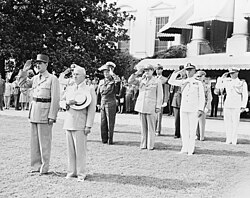User:Loc Vu-Quoc/sandbox
Nguyen Ngoc Bich
Introduction
| Nguyễn Ngọc Bích | |
|---|---|
| Born | 18 May 1911 Ben Tre, Vietnam |
| Died | 4 Dec 1966 Thu Duc, Vietnam |
| Occupation | *Engineer
|
| Title | Doctor (medical) |
| Known for | Resistance war, politics |


Nguyễn Ngọc Bích (1911–1966) was a French-educated engineer, a hero in the Vietnamese resistance against the French colonists,[1]:850. Note a French-educated medical doctor, an intellectual and politician, who proposed an alternative viewpoint to avoid the high-casualty, high-cost war between North Vietnam and South Vietnam.[2]
The Nguyen-Ngoc-Bich street in the city of Cần Thơ, Vietnam, was named after him to honor and commemorate his feats (of sabotaging bridges to slow down the colonial French-army advances) and heroism (being on the French most-wanted list,[3]:122 imprisoned, subjected to an "intensive and unpleasant interrogation"[3]:122 that left a mark on his forehead,Note and exiled) during the First Indochina War.
Upon graduating from the École polytechnique (engineering military school under the French Ministry of Armed Forces) and then from the École nationale des ponts et chaussées (civil engineering) in France in 1935,[4] Dr. Bich returned to Vietnam to work for the French colonial government. After World War II, in 1945, he joined the Viet-Minh, and became a senior commander in the Vietnamese resistance movement, and insisted on fighting for Vietnam's independence, not for communism.
Suspecting[5] of being betrayed by the Communist faction[5] of the Viet-Minh and apprehended by the French forces, he was saved from execution by a campaign for amnesty by his École polytechnique classmates based in Vietnam, mostly high-level officers of the French army,[6]: 299 and was subsequently exiled to France, where he founded with friends and managed the Vietnamese publishing house Minh Tan (in Paris), which published many important works for the Vietnamese literature.[7] In parallel, he studied medicine and became a medical doctor. He was highly regarded in Vietnamese politics, and was suggested by the French in 1954 as an alternative to Ngo Dinh Diem as the sixth prime minister of the State of Vietnam under the former Emperor Bao Dai as Head of State,[8]:84 who selected Ngo Dinh Diem as prime minister. While Bich's candidature for the 1961 presidential election in opposition to Diem was, however, declared invalid by the Saigon authorities at the last moment for "technical reasons",[9][4], he was "regarded by many as a possible successor to President Ngo Dinh Diem".[9][10][11]
A large majority of the information in this article came from the master document Nguyen Ngoc Bich (1911–1966): A Biography,[12] which contains even more information, including primary-source evidence and photos, than presented here.
Important historical events that affected Bich's adult life, together with those mentioned in his 1962 paper (e.g., failed agrarian reform, napalm bombs, famine, conquest for rice, etc.) are summarized, in particular the atmosphere in which Bich had lived for ten years working for the French colonialists (from 1935 to 1945), and the historical conditions that drove this French-educated engineer to become a "Francophile anticolonialist"Note 1, Note 2 and to join the Viet Minh in 1945 (e.g., the French brutal repressions in 1940 and 1945, the power vacuum after the Japanese coup de force in 1945, Ho Chi Minh's call for a general uprising from Tân Trào, the 1945 August Revolution, the Black Sunday on 1945 Sep 2 in Saigon, etc.). The key principle is to summarize a historical event only when it was directly related to Bich's activities. Care is exercised in selecting references and quotations that complement, but not duplicate, other Wikipedia articles at the time of this writing. For example, the history and the general use of napalm bombs, which Bich mentioned in his 1962 article, are not summarized. Regarding the French using American-made napalm bombs in the First Indochina War, well-known battlesNote are also not summarized.
Bao Dai to de Gaulle ❝I beg you to understand that the only means of safeguarding French interests and the spiritual influence of France in Indochina is to recognize the independence of Vietnam unreservedly and to renounce any idea of reestablishing French sovereignty or rule here in any form. . . . Even if you were to reestablish the French administration here, it would not be obeyed, and each village would be a nest of resistance. . . . We would be able to understand each other so easily and become friends if you would stop hoping to become our masters again.❞ --- Bao Dai, message to de Gaulle on 1945 Aug 20
First Indochina War
I AM HERE 2024.5.11.The broader historic events of World War II and the First Indochina War—specifically, the short interwar period between end of the former and the beginning of the later—led to the context in which Nguyen Ngoc Bich fought the French colonists until he was captured. The activities directly or indirectly affected Bich's life by four historic individuals are summarized. French General de Gaulle, by his desire to reconquer Indochina as a French colony, was a main force that led to the First Indochina War, in which Bich fought. Ho Chi Minh, founder and leader of the Viet Minh, called for the general uprisingTemplate:Em dashagainst the French colonists and the Japanese occupiersTemplate:Em dashto which Bich responded. US President Franklin Delano Roosevelt ardent anticolonialism could have prevented the two Indochina wars, and changed the course of history. US President Harry Truman was a reason that the First Indochina War is now called the “French-American” War in Vietnamese literature,Template:Sfn and through his support for the French war effort supplied napalm bombs, which Bich mentioned in his 1962 paper. The US funded more than 30% of the war cost in 1952 under US President Eisenhower, and "nearly 80%" in 1954 under Truman.[lower-alpha 1]
Charles de Gaulle
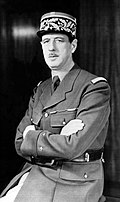
At the beginning of World War II, in his historic four-minute call-to-arms broadcast from London on 1940 June 18, later known as L'Appel du 18 Juin in French history, the mostly then unknown[lower-alpha 2] General de Gaulle counted on the French Empire, with Indochina as the "Pearl of the Empire", rich in rubber, tin, coal, and rice,Template:Sfn to provide resources to fight the Axis, with the support of the British Empire and the powerful industry of the United States. Understanding that Indochina was under the menace of occupation by the Japanese, de Gaulle harbored the dream of wresting this colony back into the fold of the French Empire, writing in his memoirs "As I saw her move away into the mist, I swore to myself that I would one day bring her back."Template:Sfn
"Within two weeks" of the death of US President Franklin Delano Roosevelt on 1945 Apr 12, de Gaulle pressured Harry Truman on the Indochina issue, and his government launched "an intensive propaganda effort to mold world opinion in favor of the status quo Template:Bracket in Indochina",Template:Sfn and this after having approved the Japanese occupation of Indochina since 1940 September 22.Template:Sfn By the time General de Gaulle[lower-alpha 3] came to the US in 1945 Aug (inset photo) to campaign for US military aid from then US President Harry Truman, the "French had been forced to drown several Vietnamese uprisings in blood. They had seen the colonial economy completely disrupted. They had been humiliated by the Germans in Europe and incarcerated by the Japanese in Indochina. Even to begin to reassert sovereignty in Indochina, the French were forced to go hat in hand to the Americans Template:Bracket, British, and Chinese."Template:Sfn
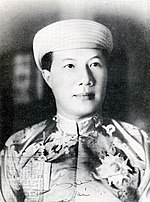
De Gaulle was a prime mover leading to the First Indochina War in which the French-educated Bich fought on the Viet Minh side against the French colonialists. On 1945 Aug 20, just ten days before he abdicated on 1945 Aug 30,[lower-alpha 4] Vietnam Emperor Bao Dai sent a moving plea to de Gaulle:[lower-alpha 5]
Just a few days later on 1945 Aug 26 (or very shortly thereafter), Ho Chi Minh put the resistance in much stronger terms to US OSS Major Archimedes Patti, who still remembered vividly after some 35 years:[lower-alpha 6]
The Southeast Asia and Buddhism expert Paul Mus, who first met Ho Chi Minh in 1945, recounted that Ho Chi Minh saidTemplate:Sfn then:[lower-alpha 7] Template:Quote frame
Paul Mus added "For every time Ho Chi Minh has trusted us, we betrayed him."[lower-alpha 7]
Ho Chi Minh
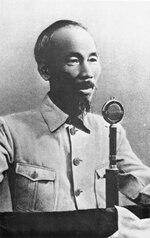
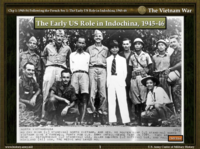
For thirty years, from 1912 when Ho Chi Minh first visited Boston and New York City until about 1948-1949, Ho held out his hope that the US would provide military support for his anticolonialist resistance against the French.Template:Sfn Since that visit to the US in his early twenties, HoTemplate:Emdashlike Bich, a Francophile anticolonialist,[lower-alpha 8][lower-alpha 9] who was both a communist and a nationalist[lower-alpha 10] Template:Emdashdeveloped a "lifelong admiration for Americans".Template:Sfn[lower-alpha 11]
Seizing on the opportunity of the Japanese entering Tonkin in 1940 SeptemberTemplate:Sfn to begin occupy Indochina (with French agreement)Template:Sfn to rid Vietnam of French colonial yoke,[lower-alpha 12] Ho (who was in Liuzhou, China) returned to the China-Vietnam border and began a "training program for cadres".Template:Sfn Then on 1941 February 8,Template:Sfn Ho crossed the border to enter Vietnam for the first time after 30 years away (from 1911 to 1941), and sheltered in cave Cốc BóTemplate:Sfn near the Pác Bó hamlet, in the Cao Bằng province, less than a mile from the Chinese border.Template:Sfn[lower-alpha 13] There Ho convened a plenum in 1941 May, and founded the Viet Minh, an anticolonialist organization that Bich joined in 1945.
On 1941 Oct 25, the Viet Minh published its first manifesto: "Unification of all social strata, of all revolutionary organizations, of all ethnic minorities. Alliance with all other oppressed peoples of Indochina. Collaboration with all French anti-fascist groups. One goal: the destruction of colonialism and imperialist fascism."[lower-alpha 14]
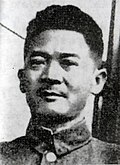
In 1942 August, Ho (named "Nguyen Ai Quoc" at that time) crossed the border into China with the intention of attracting the interest of the Allies in ChungkingTemplate:Sfn (now Chongqing) for the Vietnamese resistance movement, arrested by the Chinese on 1942 August 28 for being "French spy",Template:Sfn but the real reason was Ho's political activities, viewed as "Communistic", instead of "nationalistic", by the Chinese (Chiang Kai-shek) and the Allies at Chungking (now Chongqing).Template:Sfn[lower-alpha 9] Ho was detained for thirteen months, starting at the Tienpao prison,Template:Sfn[lower-alpha 16] moving through eighteen different prisons,Template:Sfn[lower-alpha 9] and ending up at LiuchowTemplate:Sfn (now Liuzhou), from where he was released on 1943 September 10, after changing his name from Nguyen Ai Quoc to Ho Chi Minh.Template:Sfn At that time, the name "Nguyen Ai Quoc" was very popular, while hardly any one heard of the new name "Ho Chi Minh".[lower-alpha 17]
Ho Chi Minh returned to Vietnam in 1944 September, after obtaining the authorization from the Chinese authority, Template:Lang-de (Zhang Fakui, Template:Lang-vi)Template:Emdashwho was under "severe pressure from the Japanese Ichigo offensive" to obtain intelligence in IndochinaTemplate:Emdashand after submitting the "Outline of the Plan for the Activities of Entering Vietnam".Template:Sfn[lower-alpha 18] All three protagonistsTemplate:Emdashthe French Vichy colonialists, the Japanese occupiers, and the Viet MinhTemplate:Emdashwere deceived by US war plan,[lower-alpha 19] and expected a US invasion of Indochina.[lower-alpha 20] Such expectation was the main reasonTemplate:Sfn that, in 1945 February-March, during an "unusually cold month of February,"Template:Sfn[lower-alpha 21] Ho once again crossed back into China, and walked from the Pác Bó hamlet to Kunming to meet[lower-alpha 22] (and to "make friends with"Template:Sfn) American OSS and OWI (Office of War Information) officers to exchange intelligence.[lower-alpha 23]Template:Sfn Ho's report to the OSS mentioned the Japanese coup de force on the evening of 1945 March 9.Template:Sfn
In Kunming, Ho requested OSS Lt. Charles Fenn[lower-alpha 24] to arrange for a meeting with Gen. Claire Chennault, commander of the Flying Tigers.Template:Sfn In the meeting that occurred on 1945 Mar 29, Ho requested a portrait of Chennault, who signed across the bottom "Yours sincerely, Claire L. Chennault".Template:Sfn Ho displayed the portrait of Chennault, along with those of Lenin and Mao, in his lodging at Tân Trào as "tangible evidence to convince skeptical Vietnamese nationalists that he had American support".Template:Sfn As additional evidence, Ho also possessed six brand-new US Colt .45 pistols in original wrappings that he requested and got from Charles Fenn.Template:SfnTemplate:Sfn This "seemingly insignificant quantity" of arms,[lower-alpha 25] together with "Chennault's autographed photograph" as evidence, convinced other factions of the primacy of the Viet Minh. Ho's American-backing ruse worked.Template:Sfn
In Cochin China (the south),[lower-alpha 26] where Bich lived and worked, Tran Van Giau (Template:Lang-vi), a Viet Minh leader and "Ho Chi Minh's trusted friend",Template:Sfn on 1945 Aug 22 used Ho's ruse of "American backing for the Viet Minh", to convince other pro-Japanese nationalist groups (Phuc Quoc, Dai Viet, United National FrontTemplate:Sfn) and religious sects (Cao Dai, Hoa Hao) that they would be outlawed by the invading Allies, and thus should accept the leadership of the Viet Minh, which had strong support of "the Allies with arms, equipment and training".Template:Sfn
Fearing a US invasion with the French colonialists helping, the Japanese initiated operation Bright Moon (Meigo sakusen), leading to a coup de force on 1945 March 9 to neutralize the French forces and to remove the French colonial administration in Indochina (and thus the status of Bich's job in the French colonial government). The resulting power vacuum following this coup de force changed the political situation, and provided a favorable setting for the Viet Minh takeover of the government. In 1945 April, Ho walked a perilous journey from Pác Bó to Tân Trào, the Viet Minh headquarters in the Liberated Area. There, on 1945 August 16, Ho called for a general uprising to throw out the Japanese occupiers that ultimately led to the August Revolution.
Even though being a son of a Cao Dai pope,Template:SfnTemplate:Sfn Bich joined the Viet Minh in 1945,[lower-alpha 27] instead of the Cao Dai force.
CBS reporter David Schoenbrun interviewed Ho Chi Minh on 1946 Sep 11, the same day that a telegram was dispatched from the High Commissioner d'Argenlieu to the French Indochina Committee on the arrest of Bich on 1946 Aug 25.:[lower-alpha 28] Template:Quote frame
Notes
Bich's injury:
A photo showing the injury mark on the forefront of Dr. Bich as a result of this "intensive and unpleasant interrogation" can be found in Nguyen Ngoc Bich (1911–1966): A Biography.[12]
Back to Jump link "Note".
Francophile anticolonialists:
"French teachings and models over Confucian ones. Some of these teachings were, to say the least, unhelpful to the colonial enterprise. Voltaire's condemnation of tyranny, Rousseau's embrace of popular sovereignty, and Victor Hugo's advocacy of liberty and defense of workers' uprisings turned some Vietnamese into that curious creature found also elsewhere in the empire: the Francophile anticolonialist."[13]:9
Back to Jump link "Note".
Back to First Indochina War
Napalm battles
See, e.g., the battle of Vinh Yen (1951), the battle of Na San (1952), the battle of Dien Bien Phu (1954), etc.
Back to Introduction,
Primary sources, quotations:
See primary sources, extensive notes and quotations in Nguyen Ngoc Bich (1911–1966): A Biography[12] and Notes on Vietnam History.[14]
Back to Jump link "Note".
Back to Introduction,
References
- ↑ Buttinger, Joseph (1967b), Vietnam: A Dragon Embattled, Vol.2, Frederik A. Praegers, New York. Retrieved on 25 Feb 2023
- ↑ Nguyen-Ngoc-Bich (March 1962), "Vietnam—An Independent Viewpoint", The China Quarterly 9. Retrieved on 18 Feb 2023, pp. 105–111. See also the contents of Volume 9, which included the articles of many well-known experts on Vietnam history and politics such as Bernard B. Fall, Hoang Van Chi, Phillipe Devillers (see, e.g., his classic 1952 book Histoire du Viet-Nam in Section References and French French Cochinchina, Ref. 40), P. J. Honey, Gerard Tongas (see, e.g, J'ai vécu dans l'Enfer Communiste au Nord Viet-Nam, Debresse, Paris, 1961, reviewed] by P. J. Honey), among others.
- ↑ 3.0 3.1 Cooper, Chester L. (1970), The Lost Crusade: America in Vietnam, Dood, Mead & Company, New York. Retrieved on 7 Mar 2023
- ↑ 4.0 4.1 Nguyen-Ngoc-Chau (2018), Le Temps des Ancêtres: Une famille vietnamienne dans sa traversée du XXe siècle, L'Harmattan, Paris, France. Retrieved on 18 Feb 2023. Preface by historian Pierre Brocheux.
- ↑ 5.0 5.1 Note: On the betrayal suspicion, Cooper, Chester L. (1970), The Lost Crusade: America in Vietnam, Dood, Mead & Company, New York. Retrieved on 7 Mar 2023, p.123, wrote: "Whether the Viet Minh had actually betrayed him to French agents is not known for certain, but Bich always suspected that this was how he had been discovered," whereas the assertion that he "was betrayed by his Communist colleagues to the French" was written in the short biography that accompanied Bich's 1962 article, as written in Honey, P.J., ed. (March 1962), "Special Issue on Vietnam", The China Quarterly 9. Retrieved on 18 Feb 2023. Volume 9, which contained the articles written by several well-known intellectuals on Vietnam history and politics such as Bernard B. Fall, Hoang Van Chi, Phillipe Devillers (See Philippe Devillers (1920–2016), un secret nommé Viêt-Nam, Mémoires d'Indochine, Internet archived 2022.06.29), P. J. Honey, William Kaye (see e.g., A Bowl of Rice Divided: The Economy of North Vietnam, 1962), Gerard Tongas, among others. See the Editorial and the brief introduction of the contributors.
- ↑ Tran-Thi-Lien (2002), Henriette Bui: The narrative of Vietnam's first woman doctor, in Gisele Bousquet and Pierre Brocheux, Viêt Nam Exposé: French Scholarship on Twentieth-Century Vietnamese Society, University of Michigan Press, ISBN 9780472098057, DOI:10.3998/mpub.12124, at 278–309. Google Book (search for "Bui Quang Chieu Ngoc Bich"), accessed 20 May 2023.
- ↑ Note: A list of important books published by Minh Tan can be found in Nguyen Ngoc Bich (1911–1966): A Biography.
- ↑ Langguth, Arthur John (2000), Our Vietnam: The war, 1954–1975, Simon & Schuster, New York. Retrieved on 14 Mar 2023
- ↑ 9.0 9.1 Honey, P.J., ed. (March 1962), "Special Issue on Vietnam", The China Quarterly 9. Retrieved on 18 Feb 2023.
- ↑ Note: A direct quote from the brief introduction of the contributors to The China Quarterly, Volume 9, 1962, reads: Dr. Bich's "personal influence upon Cochin Chinese opinion is considerable, and he is regarded by many as a possible successor to President Ngo Dinh Diem".
- ↑ Note: The Editorial of The China Quarterly, Volume 9, reads: "Five of our articles are by specialists who have observed the Hanoi regime from a distance. M. Tongas and Mr. Hoang Van Chi are writing on the basis of personal experience. Dr. Bich presents an independent view of the whole Vietnamese situation.
- ↑ 12.0 12.1 12.2 Nguyen-Ngoc-Chau & Vu-Quoc-Loc (2023), Nguyen Ngoc Bich (1911–1966): A Biography, Internet Archive. Retrieved on 21 Mar 2023, CC-BY-SA 4.0. (Backup copy.) Much of the information in the present article came from this biography, which also contains many relevant and informative photos not displayed here.
- ↑ Logevall, Fredrik (2012), Embers of War: The Fall of an Empire and the Making of America's Vietnam, Random House, New York. Retrieved on 12 Apr 2012, 864 pp. Winner of the 2013 Pulitzer Prize in History: "For a distinguished and appropriately documented book on the history of the United States, Ten thousand dollars ($10,000). A balanced, deeply researched history of how, as French colonial rule faltered, a succession of American leaders moved step by step down a road toward full-blown war" • Winner of the 2013 Francis Parkman Prize from the Society of American Historians • Winner of the 2013 American Library in Paris Book Award • Winner of the Council on Foreign Relations 2013 Gold Medal Arthur Ross Book Award • Finalist for the 2013 Cundill Prize in Historical Literature.
- ↑ Vu Quoc Loc (2023a), Notes on Vietnam History, Internet Archive. Retrieved on 27 Jun 2023, CC BY-SA 4.0.
Cite error: <ref> tags exist for a group named "lower-alpha", but no corresponding <references group="lower-alpha"/> tag was found

